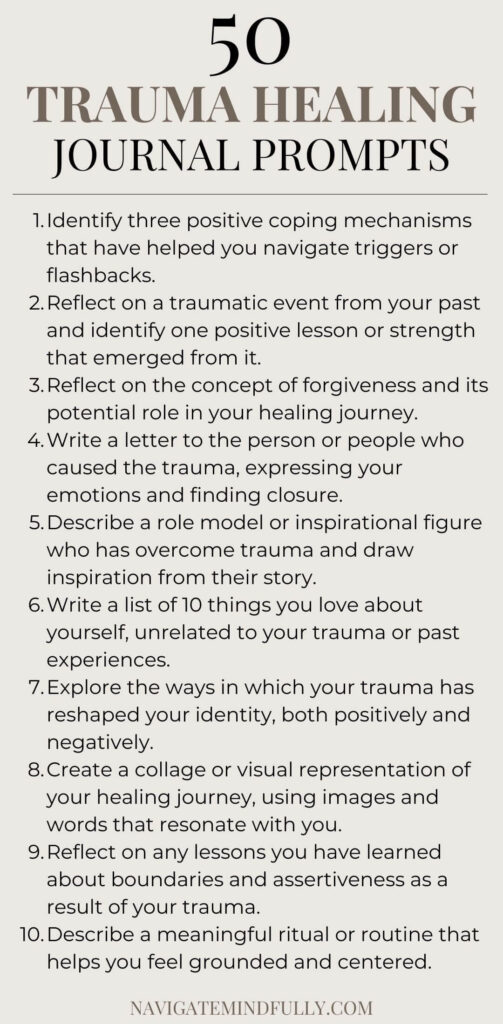50 Journal Prompts for Healing Trauma
It can be very hard to process and heal from trauma. But I want you to know, you are not alone in this, and it’s not gonna hurt forever! There are various methods to heal yourself, but one that’s particularly helpful is journaling. Journal prompts for healing trauma are not only thought-provoking but also allow you to confront and work through your trauma in a safe and private space.
Not only is it accessible and affordable, but it can also be done in the comfort of your own home. There are many different journal prompts available that can help you explore your emotions and experiences, and ultimately lead to healing and growth. In this post, I’ll be sharing some of my favorite journal prompts for healing trauma, as well as some tips for getting started.
TRY THESE: 65 HEALING AFFIRMATIONS FOR LETTING GO
Why Journaling is Important for Healing Trauma
Journaling can be especially helpful for individuals who have experienced trauma, as it provides an outlet to release and process the intense emotions that often accompany traumatic experiences. Through journaling, you are able to identify patterns in your thoughts and behaviors, which helps you understand and manage your triggers.
Additionally, journaling can help you gain a new perspective on your trauma. By writing about your experiences, you are able to see your trauma from different angles and gain a deeper understanding of how it has impacted you. This allows you to work through your trauma in a more holistic way.
Furthermore, journaling is e a tool for self-care. Taking the time to sit down and write can be a form of self-love and self-compassion. It allows you to prioritize your mental health and well-being, which is crucial in the healing process.
RELATED POST: 50 SELF CARE JOURNAL PROMPTS TO BOOST YOUR WELL-BEING

50 Trauma Healing Journal Prompts
- Reflect on a traumatic event from your past and identify one positive lesson or strength that emerged from it.
- Write a letter to your younger self, offering compassion and support during a difficult time.
- Describe a safe, nurturing place or environment that brings comfort and peace.
- Explore the physical sensations associated with trauma and practice gentle self-care techniques to soothe your body.
- Write about a person or community who has been instrumental in your healing journey and express gratitude towards them.
- Recall a moment of triumph or personal growth you have experienced since the trauma occurred.
- List five self-affirmations that challenge negative beliefs or self-perceptions rooted in your trauma.
- Write a poem or short story that symbolizes your journey toward healing and resilience.
- Explore any recurring dreams or nightmares related to your trauma and attempt to decipher their underlying meanings.
- Describe a new hobby or activity that you have recently discovered and how it contributes to your healing process.
- Reflect on the concept of forgiveness and its potential role in your healing journey.
- Write a letter to the person or people who caused the trauma, expressing your emotions and finding closure.
- Identify three positive coping mechanisms that have helped you navigate triggers or flashbacks.
- Describe a role model or inspirational figure who has overcome trauma and draw inspiration from their story.
- Write a list of 10 things you love about yourself, unrelated to your trauma or past experiences.
- Explore the ways in which your trauma has reshaped your identity, both positively and negatively.
- Create a collage or visual representation of your healing journey, using images and words that resonate with you.
- Reflect on any lessons you have learned about boundaries and assertiveness as a result of your trauma.
- Write a letter to a support group or therapy community, sharing your experiences and offering encouragement to others.
- Explore the concept of self-forgiveness and practice letting go of any blame or guilt associated with the trauma.
- List five songs that resonate with your healing journey and create a playlist to uplift your spirits during difficult times.
- Describe a meaningful ritual or routine that helps you feel grounded and centered.
- Write a dialogue between your past and present selves, exploring how your perspectives have evolved over time.
- Identify three small acts of self-care you can integrate into your daily routine to promote healing.
- Reflect on any positive changes or growth in your relationships as a result of your healing process.
- Write a letter to your body, expressing gratitude for its resilience and ability to heal.
- Explore the concept of self-compassion and practice speaking to yourself with kindness and understanding.
- Describe a person or activity that brings you joy and allows you to experience moments of pure happiness.
- Reflect on any challenges or setbacks you have faced in your healing journey and identify strategies for overcoming them.
- Write a list of 10 things you are excited about or looking forward to in the future, despite your past trauma.
- Explore the concept of trust and reflect on any progress you have made in rebuilding trust in yourself and others.
- Describe a fictional character or superhero who embodies qualities that inspire and empower you in your healing process.
- Write a gratitude list, focusing on the people, experiences, or resources that have supported your healing.
- Reflect on any changes you have noticed in your perception of the world or your beliefs about safety and security.
- Describe a moment of vulnerability in your healing journey and acknowledge the strength it takes to be open and honest.
- Write a letter to your support system, expressing your appreciation for their unwavering presence and understanding.
- Describe a self-care ritual that brings you a sense of comfort and nurturance during challenging times.
- Reflect on the progress you have made in setting healthy boundaries and protecting your emotional well-being.
- Write a letter to your inner child, offering love, reassurance, and protection.
- Explore the impact of your trauma on your perception of trust and intimacy, and identify steps towards healing in those areas.
- Describe a piece of artwork, a photograph, or a symbol that represents your journey towards healing, and explain its significance.
- Reflect on the role of self-expression in your healing process, and explore different creative outlets that have been helpful to you.
- Write a letter to a supportive figure in your life, expressing gratitude for their unwavering belief in your healing journey.
- Describe a meaningful quote or mantra that inspires you and helps you stay grounded during difficult moments.
- Reflect on any personal strengths or qualities that have emerged as a result of your resilience and healing.
- Write a forgiveness letter to yourself, releasing any self-blame or shame associated with the trauma.
- Explore the concept of self-empowerment and identify steps you can take to regain a sense of personal agency.
- Describe a nature scene or outdoor setting that brings you peace, and consider incorporating it into your healing practices.
- Reflect on the progress you have made in cultivating self-compassion and extending kindness towards yourself throughout your healing journey.
- Reflect on a moment of courage and resilience you have demonstrated in the face of your trauma, and celebrate the strength within you that allowed you to overcome it.
Pin these trauma-healing journal prompts for later!

How to Start Journaling for Trauma Healing
Starting a journaling practice can be challenging, especially when dealing with trauma. Here are some tips on how to start trauma healing journaling:
1. Find a quiet and comfortable space: Find a quiet and comfortable space where you can focus on your thoughts and feelings without distractions. This could be a cozy corner in your home, a park bench, or a quiet coffee shop.
2. Set aside time for journaling: Make sure to set aside time for journaling in your schedule. This could be a few minutes each day or a longer session once a week. It’s important to make journaling a consistent part of your routine.
3. Choose journal prompts: Journal prompts can be helpful in guiding your writing and exploring your emotions. Choose journal prompts for trauma healing that resonate with you and allow you to express your thoughts and feelings in a meaningful way.
4. Write without judgment: When journaling, allow yourself to write without judgment. Don’t worry about grammar or spelling, and don’t censor your thoughts or emotions. Expressive writing can be a powerful tool for processing trauma, so try to be as honest and authentic as possible.
5. Use journaling as a coping strategy: Journaling can be a valuable coping strategy for managing symptoms of trauma. When you feel overwhelmed or triggered, turn to your journal as a way to process your emotions and find a sense of calm.
TRY THESE: SELF LOVE JOURNAL PROMPTS: 70 POWERFUL QUESTIONS FOR POSITIVE JOURNALING
Overall, journaling can be a powerful tool for healing from trauma. By creating a safe and consistent space for writing, using prompts to guide your exploration, and writing without judgment, you can use journaling as a way to process your emotions and find healing.







